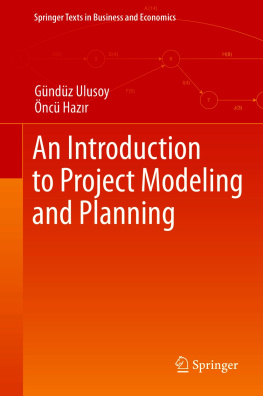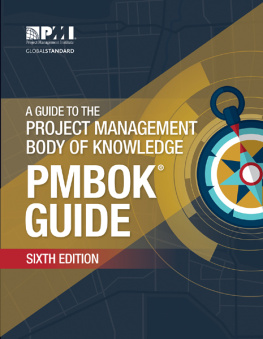Project Psychology
Project Psychology
Using Psychological Models and Techniques to Create a Successful Project
SHARON DE MASCIA
Chartered Business Psychologist
GOWER
Sharon De Mascia 2012
All rights reserved. No part of this publication may be reproduced, stored in a retrieval system or transmitted in any form or by any means, electronic, mechanical, photocopying, recording or otherwise without the prior permission of the publisher.
Sharon De Mascia has asserted her moral right under the Copyright, Designs and Patents Act, 1988, to be identified as the author of this work.
Published by
Gower Publishing Limited
Wey Court East
Union Road
Farnham
Surrey, GU9 7PT
England
Ashgate Publishing Company
Suite 420
101 Cherry Street
Burlington,
VT 05401-4405
USA
www.gowerpublishing.com
British Library Cataloguing in Publication Data
De Mascia, Sharon.
Project psychology : using psychological models and techniques to create a successful project.
1. Project management--Psychological aspects. 2. Personnel management--Psychological aspects.
I. Title
658.404019-dc22
ISBN: 978-0-566-08942-8 (hbk)
IBSN: 978-1-4094-3829-8 (ebk)
ISBN: 978-1-4094-5931-6 (ebk-ePUB)
Library of Congress Cataloging-in-Publication Data
De Mascia, Sharon.
Project psychology : using psychological models and techniques to create a successful project / by Sharon De Mascia.
p. cm.
Includes bibliographical references and index.
ISBN 978-0-566-08942-8 (hbk) -- ISBN 978-1-4094-3829-8
(ebook) 1. Project management--Psychological aspects. 2. Teams in the
workplace--Psychological aspects. I. Title.
HD69.P75D399 2011
658.404019--dc23
2011025338

Printed and bound in Great Britain by the MPG Books Group, UK
Contents
List of Figures
List of Tables
About the Author
Sharon De Mascia is the Director of Cognoscenti, a business Psychology Consultancy. www.cognoscenti.uk.com. She is a Chartered Business Psychologist and a HR/HRD professional. She has extensive project management experience and is Prince2 qualified as well as being an experienced Coach.
She has 20 years experience of delivering change management and other organisational initiatives across both public and private sectors. In the past she has worked with: Dorset Training and Enterprise Council, the NHS, Tyneside Training and Enterprise Council, The Employment Service, The Highways Agency, The Co-operative Insurance Society, The Vita Group, and Mendas.
Sharon is an assessor for the British Psychological Society and the Health Professions Council and an examiner for the International Baccalaureate in Psychology.
Reviews for Project Psychology
This book delivers in detail what its title promises. It looks at all stages and process involved in project management and introduces methods and tools from Psychology (particularly Work and Occupational Psychology) that will aid success at each stage. It does not preach or condescend but allows the reader an opportunity to consider a range of approaches to people skills and people management which will allow the content of any project to be managed and led effectively.
The content is very accessible and each stage is self contained in an individual chapter. Tools and methods are introduced and reflective questions and useful illustrative tables guide the reader towards useful practice and a good understanding of what they can achieve by adopting the various approaches and specific tools. It is jargon free and is an excellent guide to the use of psychology in a practical setting by a non psychologist. It is a consultant in a book.
Dr P A Lindley, Chartered Psychologist and
Registered Occupational Psychologist
The principal factors in project success (and failure) are to do with people. Sharon De Mascias book is a highly accomplished and relevant guide to getting the best out of people in projects. It deserves a place on the desk of anyone involved in a project be they a sponsor, stakeholder, customer or project manager.
Eric Woodcock, CEng FRSA
Introduction
What is Project Management?
Projects vary considerably in terms of scale, cost, impact, duration and project management is basically an all-encompassing term which is used to describe the management of such projects. The list of what constitutes a project is endless and can range from having the office decorated to implementing a multi-million-pound global IT system. As one would imagine, there are many definitions of project management; however, the most definitive ones are those provided by the Office of Government and Commerce who developed Prince2 and the American Project Management Institute. The Prince2 definition of project management is: a management environment that is created for the purpose of delivering one or more business products according to the Business Case. The definition provided by the American Project Management Institute is The application of knowledge, skills, tools and techniques to project activities to meet project requirements.
In reality, there are a number of models that aim to provide support and consistency for project managers; however, they are very much focused on the mechanics of project delivery. It is important to recognise that project management models such as Prince2 are not intended to provide a full guide to project management but, in the words of Prince2 itself, solely contain a set of concepts and project management processes that are the minimum requirement for a properly run and managed project (Prince2 manual).
Project management models such as Prince2 and that of the PMI do not include any guidance on how to deal with the two things that most projects have in common: firstly, they involve people, and secondly they bring about change for someone (Reiss 1992). These two factors are fundamental to the success of any project yet they are given only scant reference in the models of project management that Project Managers are encouraged to follow. A number of the available models are rigorous and identify the nuts and bolts of project processes; however, they still fail to take account of the psychology of managing people and the psychology of managing change. These people factors are increasingly emerging as significant success factors in project management.
Briner (1992) comments that the world of traditional project management is evolving rapidly in fundamental ways. Firstly it is moving away from a preoccupation with planning and control tools as the key to success and towards the management of people and their performance. This perception is echoed by Reiss (1992) who comments that projects generally involve people and they usually bring about change for someone. He then goes on to comment that Project Management is the management of change.
I would agree entirely with Reisss comment; however, in my experience, the change that Briner suggested does not appear to be happening. Prince2 and similar project management methodologies are based on sets of processes which are clear and fairly prescriptive, the idea being that if you put these processes in place, you will have a successful project. Given that the processes are fairly linear and mechanical in nature, they appear to be attracting non-people-oriented project managers, that is, people with IT and technical backgrounds. This can be very useful for IT projects; however, there appears to be a skill set missing which deals with people and managing the people-aspects of change. I believe that this is one of the reasons why a number of the big organisational-wide projects either fail completely or fail to realise the benefits that they set out to achieve.
Next page











